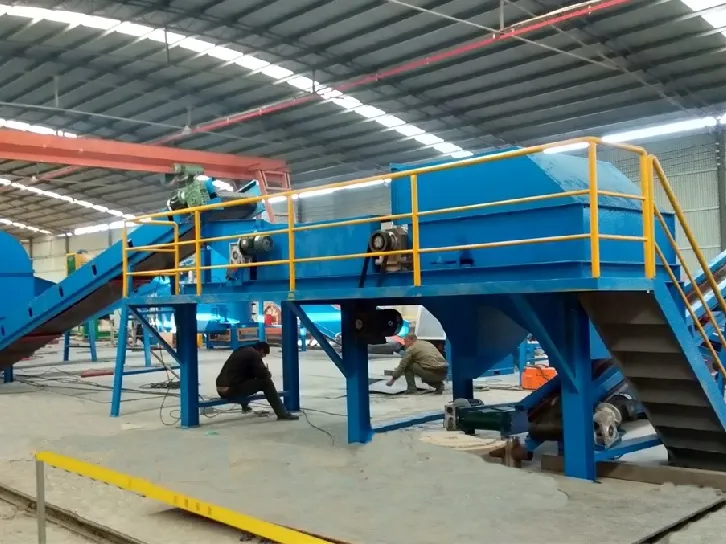

lis . 28, 2024 12:41 Back to list
The Importance of Scrap Metal Recycling Plants in Modern Industry
In an era dominated by environmental concerns and a growing emphasis on sustainable practices, scrap metal recycling plants play an increasingly vital role in the economy. These facilities are not just places where discarded metals end up; they are pivotal to the recycling and manufacturing processes, transforming what could be waste into valuable resources.
Understanding Scrap Metal Recycling
Scrap metal recycling refers to the process of collecting, processing, and repurposing various metal materials that are no longer in use. This can include anything from old cars, appliances, and machinery to construction debris. The distinction between ferrous (iron and steel) and non-ferrous (aluminum, copper, brass, etc.) metals is essential, as they are processed differently and have varying market values.
Scrap metal recycling plants operate by gathering metals from diverse sources, sorting them according to type, and preparing them for melting and reforming. This process not only saves energy but also conserves raw materials, making it an essential part of a circular economy.
Environmental Benefits
One of the most significant advantages of scrap metal recycling is its positive impact on the environment. By recycling metals, we reduce the need for mining new materials, which is an environmentally detrimental process. Mining requires substantial energy and water, disrupts ecosystems, and can lead to soil and water pollution. Recycling scrap metal significantly lowers these environmental risks.
According to the Institute of Scrap Recycling Industries (ISRI), recycling one ton of steel can save over 1,100 kg of iron ore, 630 kg of coal, and 120 kg of limestone. Moreover, recycling aluminum is particularly beneficial. Producing aluminum from scrap uses 95% less energy compared to extracting it from bauxite ore.
Economic Contributions
Scrap metal recycling plants also provide significant economic benefits. They create jobs both within the recycling facilities and in related sectors, such as logistics and manufacturing. In many regions, these plants serve as a lifeline for local economies, especially in areas where traditional manufacturing jobs have declined.

Moreover, recycling helps stabilize metal prices and creates a more resilient supply chain. By providing a steady stream of recycled materials, they reduce the volatility often seen in raw material markets. This reliability is crucial, as industries increasingly rely on recycled metals to meet their production demands.
Technological Innovations
The scrap metal recycling industry has seen remarkable advancements in technology. Modern recycling plants utilize advanced sorting and processing equipment that improves efficiency and reduces contamination rates. Technologies such as automated sorting systems, shredders, and magnetic separators streamline operations, making it easier to separate different types of metals and prepare them for recycling.
Additionally, many facilities are adopting practices that enhance the overall sustainability of their operations, such as using renewable energy sources and implementing water recycling systems. These innovations not only help reduce the carbon footprint of recycling operations but also align with industry regulations and consumer expectations for greener practices.
Challenges Ahead
Despite the numerous benefits, scrap metal recycling plants do face significant challenges. Fluctuating metal prices can impact the profitability of recycling operations, and the increasing complexity of electronic waste can pose sorting challenges. Additionally, regulatory pressures and the need for compliance with environmental standards can be burdensome for smaller facilities.
However, the industry is evolving. Collaboration between stakeholders, investments in technology, and better regulation can help overcome these hurdles, ensuring that scrap metal recycling remains a robust and essential segment of the economy.
Conclusion
Scrap metal recycling plants are crucial to fostering a sustainable future. They conserve natural resources, minimize ecological impact, and provide economic benefits to communities. As technology advances and industry practices improve, the role of these facilities will only grow more significant. Embracing and supporting scrap metal recycling not only helps combat environmental challenges but also paves the way for a more circular and sustainable economy. By valuing scrap metal as an asset rather than waste, we can contribute to a healthier planet and a thriving economy.
Latest news
The Future of Metal Recycling: Revolutionizing Waste Management
NewsMay.14,2025
Optimizing Waste with Recycling Lines
NewsMay.14,2025
Municipal Solid Waste Sorting Line: Revolutionizing Waste Management
NewsMay.14,2025
Metal Shredders: Essential Tools for Efficient Recycling
NewsMay.14,2025
Maximize Your Profits with a Copper Wire Granulator
NewsMay.14,2025
Home Metal Shredder: A Smart Choice for Your Home Recycling Needs
NewsMay.14,2025